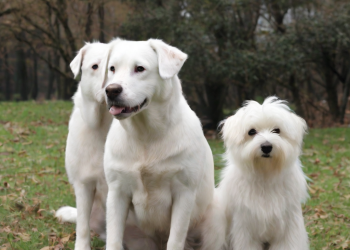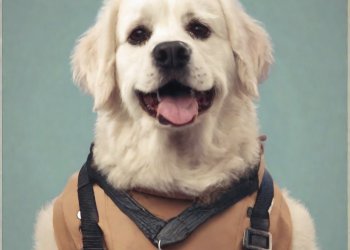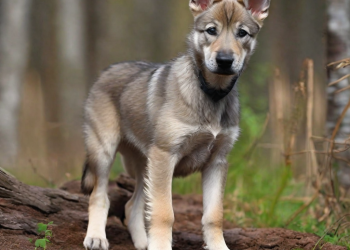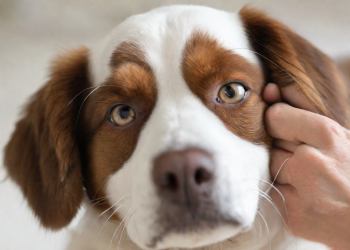Dogs with down syndrome: a little-known condition in the canine world
Researching Down syndrome in dogs, I discovered that it is a rare condition but that it can affect our pets in the same way as humans. Although there is no specific cause, it is believed that certain breeds are more likely to have this genetic condition. However, with love, patience and proper care, dogs with Down syndrome can lead happy and fulfilling lives with their owners.
Dogs with Down syndrome?
Discover how this genetic condition affects dogs and how you can help your pet live a happy, healthy life.
Don’t miss this interesting information about dogs with Down syndrome! You will learn about the symptoms, diagnosis and treatment of this condition in dogs, as well as tips to care for your pet and improve its quality of life. Read on to find out everything you need to know about dogs with Down syndrome!
II. How is down syndrome in dogs diagnosed?
Down syndrome in dogs is a genetic condition that can affect certain breeds of dogs. Although it is not as common as in humans, it is important to know how this condition is diagnosed in our canine friends.
A. Tests and examinations used to diagnose down syndrome in dogs
- Physical exam: A veterinarian can detect certain common physical traits in dogs with Down syndrome, such as bulging eyes and a smaller head.
- Genetic testing: Tests can be performed to detect chromosomal abnormalities in dogs, which may indicate the presence of down syndrome.
- Blood tests: Blood tests may be performed to detect abnormal levels of certain hormones, which may be an indicator of down syndrome in dogs.
B. Difficulties in diagnosing down syndrome in dogs
Because Down syndrome in dogs is not as common as in humans, it can be difficult to diagnose. Additionally, some dogs may have mild symptoms or no symptoms at all, making diagnosis even more difficult.
C. Importance of an accurate diagnosis for the treatment and care of the dog
It is important that a dog with down syndrome be diagnosed correctly so that it can receive the proper treatment and care. An accurate diagnosis can also help owners better understand their dog’s special needs and how they can help them lead a happy, healthy life.
III. What breeds of dogs are most likely to have down syndrome?
Down syndrome in dogs with down syndrome is not exclusive to a particular breed, but there are certain breeds that have a higher probability of developing it. Some of these breeds include:
- French Bulldog
- English bulldog
- German shepherd
- golden retriever
- poodle
These breeds have a greater genetic predisposition to down syndrome compared to other dog breeds.
Genetic and hereditary factors that can increase the likelihood of down syndrome in dogs
Like in humans, down syndrome in dogs with down syndrome can be caused by a genetic abnormality. Some factors that can increase the likelihood of a dog having down syndrome are:
- Inheritance of an extra chromosome: As in humans, dogs can inherit an extra chromosome that causes down syndrome.
- Inbreeding: Breeding between closely related dogs can increase the likelihood of puppies having down syndrome.
- Age of the mother: As in humans, the age of the mother can be a risk factor for Down syndrome in dogs.
Possible reasons why certain breeds are more prone to down syndrome
Although a specific reason why certain breeds of dogs have a higher chance of having Down syndrome has not been determined, it is believed that it may be due to genetic selection for certain physical characteristics or behavioral traits. Additionally, some breeds may have a higher incidence of inbreeding, increasing the risk of genetic abnormalities.
IV. Impact of down syndrome on the lives of dogs
Down syndrome in dogs can have a significant impact on their lives and the lives of their owners. Below, we will explore how this condition affects the development, health, behavior and relationship between the dog and its owner.
Physical and mental development
- Delayed growth and physical development
- Difficulties in learning and understanding
- Limitations in motor capacity and coordination
Common health problems
- Congenital malformations, such as cleft palate and heart problems
- Increased risk of respiratory and digestive diseases
- Vision and hearing problems
Behavior and training
- Difficulties in learning commands and obedience
- Tendency to be more shy or anxious
- Increased need for special attention and care
Special care and adaptations
- Proper diet and exercise to maintain good health
- Therapies and treatments recommended by veterinarians
- Adaptations at home to facilitate the dog’s mobility
V. How to help dogs with down syndrome
Owners of dogs with Down syndrome can take steps to improve their pet’s quality of life. Here are some ways to help dogs with this condition:
Food and exercise
- Provide a balanced diet appropriate for the dog’s needs
- Exercise regularly to maintain good physical and mental health
Therapies and treatments
- Follow veterinarian recommendations for specific therapies and treatments
- Explore alternative therapy options, such as acupuncture or physical therapy
Behavior management and training
- Be patient and use positive training techniques
- Seek help from a professional trainer if necessary
emotional support and care
- Provide unconditional love and attention to the dog
- Seek support from other owners of dogs with down syndrome
SAW. Impact on the relationship between the dog and its owner
Although owning a dog with Down syndrome can present challenges, it can also strengthen the connection between dog and owner in unique ways. Some aspects to consider are:
Benefits and challenges
- Greater empathy and compassion on the part of the owner
- Challenges in dog care and management
Patience and love
- The importance of having patience and love in your relationship with your dog
- The dog’s ability to teach valuable lessons about acceptance and unconditional love
Strengthening the connection
- The possibility of a deeper and more meaningful connection between dog and owner
- The dog’s ability to bring joy and happiness despite its limitations
VII. Measures to help dogs with down syndrome
There are several organizations and resources available to help dogs with down syndrome and their owners. Some measures being taken include:
Organizations and associations
- Nonprofit organizations dedicated to helping dogs with down syndrome
- Associations that promote the adoption of dogs with special needs
Advances in research and treatment
- Ongoing research to better understand Down syndrome in dogs
- Development of more effective treatments and therapies
Programs and resources
- Adoption and care programs for dogs with down syndrome
- Online resources for owners of dogs with this condition
VIII. inspiring stories
There are many dogs with down syndrome that have overcome obstacles and lead happy lives thanks to the love and care of their owners. Some touching stories include:
Examples of successful dogs with down syndrome
- Dogs that have been trained as service or therapy dogs
- Dogs that have participated in agility and obedience competitions
Owner Testimonials
- Experiences of owners of dogs with down syndrome and how they have handled the situation
- Positive impact the dog has had on its owner’s life
Inspiration and hope
- The ability of dogs with down syndrome to bring joy and love to their owners
- The importance of accepting and loving dogs with special needs
V. How to help dogs with down syndrome
Dogs with down syndrome need special care and attention to live healthy and happy lives. Here are some ways owners can help their pets with Down syndrome:
A. Proper diet and exercise
- It is important to provide a balanced diet appropriate for the nutritional needs of dogs with Down syndrome.
- Regular exercise is also essential to keep these dogs fit and healthy.
B. Recommended therapies and treatments
- Depending on each dog’s individual symptoms and needs, therapies such as physical therapy, occupational therapy, or speech therapy may be recommended.
- Medical treatments may also be necessary to address specific health problems associated with down syndrome in dogs.
C. Behavior Management and Training
- Dogs with Down syndrome may have behavioral and training difficulties due to their physical and mental limitations.
- It is important to be patient and use positive training methods and positive reinforcement to help these dogs learn and adapt.
D. Emotional support and necessary care
- Dogs with down syndrome may need more attention and care than other dogs.
- It is important to provide them with love, patience, and emotional support to help them feel safe and loved.
By following these guidelines, owners can help their dogs with Down syndrome lead full and happy lives. Always remember to consult with a veterinarian and follow their recommendations to ensure the best care for your pet.
SAW. Impact on the relationship between the dog and its owner
Down syndrome in dogs can have a significant impact on the relationship between the dog and its owner. Below, the benefits and challenges of owning a dog with Down syndrome will be explored, as well as tips for fostering a positive and healthy relationship.
Benefits and challenges of having a dog with down syndrome
- Dogs with Down syndrome can be a source of unconditional love and joy for their owners.
- Their presence can help reduce stress and anxiety in their owners.
- Dogs with Down syndrome can teach their owners important lessons about acceptance and inclusion.
- However, they can also present challenges in terms of special care and adaptations necessary to improve their quality of life.
Importance of patience and love in the relationship between the dog and its owner
It is important to note that dogs with Down syndrome may have behavioral and training difficulties due to their physical and mental limitations. Therefore, it is crucial to have patience and love when interacting with them.
How Down Syndrome Can Strengthen the Connection Between Dog and Owner
Despite the challenges, owning a dog with Down syndrome can strengthen the connection between the dog and its owner. By overcoming obstacles together and accommodating the dog’s special needs, an even stronger and more meaningful bond can be formed.
Tips to foster a positive and healthy relationship
- Communicate with the dog through gestures and signs instead of just words.
- Establish a routine and be consistent in the care and training of the dog.
- Provide a safe and stress-free environment for the dog.
- Seek support and advice from professionals and other owners of dogs with Down syndrome.
In short, although owning a dog with Down syndrome can present challenges, it can also be a rewarding and enriching experience. With love, patience and proper care, a special and lasting relationship can be formed between the dog and its owner.
VII. Measures to help dogs with down syndrome
Dogs with down syndrome need special care and attention to lead happy and healthy lives. Fortunately, there are measures and resources available to help these dogs and their owners. Below are some of the measures being taken to support dogs with down syndrome:
A. Organizations and associations dedicated to helping dogs with down syndrome
- These organizations focus on providing information, support and resources to owners of dogs with down syndrome.
- They also work to raise awareness about this condition and promote the inclusion of these dogs in society.
- Some of these organizations are:
- Association of Dogs with Down Syndrome
- Foundation for Dogs with Down Syndrome
- International Association of Dogs with Down Syndrome
B. Advances in the research and treatment of down syndrome in dogs
- As more is learned about Down syndrome in dogs, research is being done to find better ways to treat and manage this condition.
- Some treatments and therapies being explored include:
- Physical and occupational therapy to improve the dog’s mobility and coordination.
- Speech and language therapy to help the dog communicate better.
- Behavioral therapy to address behavioral problems and training.
- Medications to treat health problems associated with down syndrome in dogs.
C. Programs and resources available for owners of dogs with down syndrome
- Some veterinary clinics and organizations offer specific programs and resources for owners of dogs with Down syndrome.
- These may include specialized training classes, support groups, and counseling to help owners manage their dogs’ unique needs.
- There are also online resources, such as forums and social networks, where owners can connect and share experiences with other owners of dogs with down syndrome.
D. Importance of raising awareness and support for dogs with down syndrome
- Although Down syndrome in dogs is a rare condition, it is important that society is informed and supports these dogs and their owners.
- By raising awareness, you can encourage inclusion and love for all dogs, regardless of their differences.
- Furthermore, by supporting dogs with Down syndrome, they are given the opportunity to lead a full and happy life with their owners.
VIII. Stories of dogs with down syndrome and their owners
A. Examples of dogs with down syndrome that have overcome obstacles and lead a happy life
- Dogs with down syndrome that have been adopted and loved by their owners
- Stories of dogs with down syndrome who have been trained to perform tasks and help their owners
- Cases of dogs with down syndrome that have participated in therapies and have improved their quality of life
B. Testimonials from owners of dogs with down syndrome and how they have handled the situation
- Personal experiences of owners of dogs with down syndrome
- Tips and recommendations on how to care for and handle a dog with down syndrome
- Reflections on the emotional impact and connection with your dog with down syndrome
C. Exciting and positive impact that dogs with down syndrome have had on the lives of their owners
- Stories of how dogs with down syndrome have brought joy and love to their owners
- Testimonies of how dogs with down syndrome have helped their owners overcome difficulties and challenges
- Reflections on the importance of accepting and loving dogs with down syndrome
D. Inspiration and hope for other owners of dogs with down syndrome
- Messages of encouragement and support for other owners of dogs with down syndrome
- Stories of how other owners have found resources and help to care for their dogs with down syndrome
- Reflections on the importance of inclusion and unconditional love towards all living beings, including dogs with down syndrome
IX. The importance of inclusion and unconditional love towards all living beings
Down syndrome in dogs is a rare but existing condition that can affect our beloved pets. Although it can be challenging for owners of dogs with Down syndrome, it is important to remember that these dogs deserve love and care just like any other. In this section, we will explore the importance of inclusion and unconditional love towards all living beings, including those with down syndrome.
Recap of key points about dogs with down syndrome
- Down syndrome in dogs is a genetic condition that can affect their physical and mental development.
- It is diagnosed through specific tests and examinations, but can be difficult to detect due to its rarity.
- Some dog breeds are more likely to have Down syndrome due to genetic and hereditary factors.
- Down syndrome can affect the dog’s life in terms of health, behavior and training.
- Owners of dogs with Down syndrome can help their pets through good nutrition, exercise, therapies and special care.
- The relationship between dog and owner can be beneficial and empowering, but it can also present challenges.
- There are organizations and resources available to help dogs with down syndrome and their owners.
- The stories of dogs with down syndrome and their owners are inspiring and demonstrate the unconditional love that exists between them.
Importance of accepting and loving dogs with down syndrome
It is important to remember that dogs with down syndrome are living beings that deserve love and care just like any other. Accepting and loving these dogs is essential for their well-being and happiness. Some reasons why it is important to accept and love dogs with down syndrome are:
- They are no different than other dogs: Despite their condition, dogs with Down syndrome are like any other dog and deserve to be treated with love and respect.
- Unconditional love: Dogs with down syndrome are capable of loving and being loved in the same way as other dogs. His love is unconditional and unaffected by his condition.
- Inclusion is important: By accepting and loving dogs with down syndrome, we are promoting inclusion and diversity in our society.
- They deserve a happy life: Like any other living being, dogs with down syndrome deserve a happy and fulfilling life. By accepting and loving them, we are giving them the opportunity to have a happy and loving life.
Final message for owners of dogs with down syndrome and those interested in adopting one
For owners of dogs with Down syndrome, it is important to remember that your pet is unique and special, and that your love and care are essential to its well-being. For those interested in adopting a dog with Down syndrome, it is important to research and educate yourself about the condition and be prepared to provide the necessary love and care.
In conclusion, Down syndrome in dogs is a condition that can present challenges, but can also be a source of love and connection between the dog and its owner. Accepting and loving these dogs is essential for their well-being and to promote inclusion and unconditional love towards all living beings.
Dogs with down syndrome: a deeper look at this condition in canines
Down syndrome is a genetic condition that affects humans and can also occur in dogs. Although it is less common in canines, it is important to understand what it is and how it affects the life of a dog with this condition. In this article, we will explore down syndrome in dogs in detail, from its definition to how we can help these animals and their owners.
What is down syndrome in dogs?
- Definition of down syndrome in humans and its relationship with dogs
- Causes of down syndrome in dogs
- Symptoms and characteristics of down syndrome in dogs
- Differences between down syndrome in humans and dogs
How is down syndrome in dogs diagnosed?
- Tests and examinations used to diagnose down syndrome in dogs
- Difficulties in diagnosing down syndrome in dogs
- Importance of an accurate diagnosis for the treatment and care of the dog
What breeds of dogs are most likely to have down syndrome?
- Most common breeds with down syndrome in dogs
- Genetic and hereditary factors that can increase the likelihood of down syndrome in dogs
- Possible reasons why certain breeds are more prone to down syndrome
How does down syndrome affect a dog’s life?
- Impact on the physical and mental development of the dog
- Common health problems associated with down syndrome in dogs
- Difficulties in the behavior and training of dogs with down syndrome
- Special care and adaptations necessary to improve the dog’s quality of life
How can owners of dogs with down syndrome help their pets?
- Importance of good nutrition and exercise for dogs with down syndrome
- Recommended therapies and treatments to improve the dog’s health and well-being
- Tips for managing the behavior and training of dogs with down syndrome
- Emotional support and care necessary for the dog and its owner
What impact does Down syndrome have on the relationship between the dog and its owner?
- Benefits and challenges of having a dog with down syndrome
- Importance of patience and love in the relationship between the dog and its owner
- How Down Syndrome Can Strengthen the Connection Between Dog and Owner
- Tips to foster a positive and healthy relationship between dog and owner
What measures are being taken to help dogs with down syndrome?
- Organizations and associations that are dedicated to helping dogs with down syndrome
- Advances in the research and treatment of down syndrome in dogs
- Programs and resources available for owners of dogs with down syndrome
- Importance of raising awareness and support for dogs with down syndrome
Stories of dogs with down syndrome and their owners
- Examples of dogs with down syndrome that have overcome obstacles and lead a happy life
- Testimonials from owners of dogs with down syndrome and how they have handled the situation
- Exciting and positive impact that dogs with down syndrome have had on the lives of their owners
- Inspiration and hope for other owners of dogs with down syndrome
In conclusion, Down syndrome in dogs is a condition that can occur in any breed and affects the animal’s life in different ways. However, with love, patience, and proper care, these dogs can lead happy and fulfilling lives. It is important to accept and love dogs with down syndrome, and support those who are dedicated to helping these animals and their owners.










